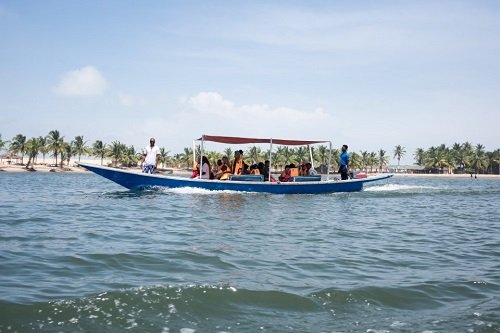Editorial
Volta lake tragedy: Let’s not ignore safety precautions

● Travellers on the Volta Lake should be provide enouugh life jackets
Dear Editor,
Five people including two females and three children have reportedly lost their lives when a boat conveying passengers to a funeral from Azizanya to Azizakpe in the Ada East District of the Greater Accra Region, capsised recently on the Volta Lake.
The boat, which was supposed to carry about 40 to 50 passengers, according to news reports, was overloaded with almost 100 passengers without life jackets.
This tragedy, I believe, could have been avoided if safety precautions were taken seriously. The boats have a required number of passengers to carry and that should not have been exceeded under any circumstance.
Although the loss is regrettable, I wonder if some of these unfortunate incidents must occur before we do or take the necessary actions.
Life jackets are designed to keep passengers from drowning in case of accidents and I believe no boat or canoe should be made to transport humans without this protective gear on board.
It is commendable that a rescue team promptly intervened to save lives and we must encourage more basic training in cardiopulmonary restitution (CPR) which is a useful lifesaving technique during emergencies.
This is not the first time we have recorded a boat disaster. In January this year, eight school children out of 220 others drowned on the lake while crossing with a canoe from Atigagome to Wayokope District Assembly Primary School.
Considering the recurring nature of these accidents, I plead with the authorities to provide more boats and canoes for residents in these catchment areas. They should also be supplied with adequate life jackets and other protective gears to save lives when the unfortunate happens.
Evelyn Naadu Borquaye,
Nungua, Accra.
Editorial
Promote welfare of African children
The African Union hosts the annual International Day of the African Child on June 16 to increase awareness of the rights and ongoing struggles of African children.
Additionally, the day offers a forum for talking about and addressing topics including healthcare, education, and safety from exploitation and abuse.
It began in 1976 when students in Soweto, South Africa, were killed for demonstrating against inequality and injustice in education.
Since children have rights that must be upheld, the African Day celebration is appropriate because it serves as a poignant reminder to our communities to put children’s needs first, ensuring that they develop and realise their full potential.
Most importantly, it pushes people, governments, and communities to address pressing issues like child labour, inadequate education, and to ensure safe, healthy environments.
This year’s theme, “Planning and budgeting for children’s rights: progress since 2010,” is no exception to the efforts done thus far by governments, individuals, parents, and others to advance the welfare of children.
In addition to their rights to nutritious food, medical care, secure housing, and high-quality education, children also require emotional support, safety, and protection from danger in order to flourish.
Children’s physical, mental, and social development depends on these necessities, yet far too many continue to be denied their rights and go without food, housing, water, or health care.
While eating, sleeping, playing, and learning are all important aspects of a child’s growth, some children do not find these activities enjoyable. Such children work independently to make ends meet although their parents are responsible for that role,
Many people and organisations have put a lot of effort into making sure that children’s rights are outlined, upheld, and safeguarded; thus, everyone must keep fighting for children’s rights.
The Convention on the Rights of a Child (CRC) was created in 1989 as a result of the Universal Declaration of Human Rights, which served as the foundation for all legal norms pertaining to children’s rights. This is the first international agreement with legal force that covers all human rights.
Therefore, a multifaceted strategy encompassing legal frameworks, education, community involvement, and tackling systemic challenges is needed to assure the preservation of children’s rights.
Laws that safeguard children from abuse must be put into place and upheld, public awareness of children’s rights and protection must be increased, and safe spaces must be established in institutions and communities.
Let us all work together to defend the rights of African children.
Editorial
Employ pros at local government level to address sanitation issues
Dear Editor,
In a car on my way to work on Tuesday, I listened to an interview on sanitation on a radio station which a local government expert said that most of the people that handled waste management issues at the Metropolitan, Municipal, and District Assemblies, were not waste management professionals but health professionals.
According to the speaker, this has contributed to the failure to address the sanitation problems, especially at the local level.
These health professionals who have been tasked to oversee waste management are only occupied with the health related dangers but have no clue on the issues at hand.
I felt very sad and found it disturbing as to why people without professional training in waste management is given responsibilities in a field alien to him.
Waste management involves a lot of processes, including segmentation of waste products as well as recycling.
Employers must know that waste management professionals at the local level was important as it helps making decisions ton how to combat it.
This is not a problem at the local government level alone. It is something across the various sectors.
Maybe this is the time for us as a country to start recruiting qualified professionals to occupy their respective fields to bring their competence to the table to solve whatever problem persist.
It is clearly a case of putting ‘square pegs in round holes.’ I believe it is about time we change that narrative and employ professionals who are qualified to find solutions to our waste management conundrum.
Baba Hafiz, Kasoa






